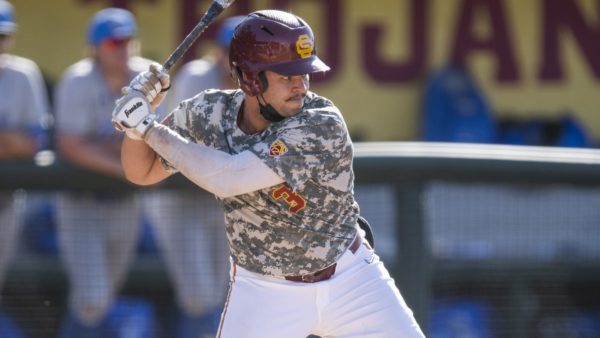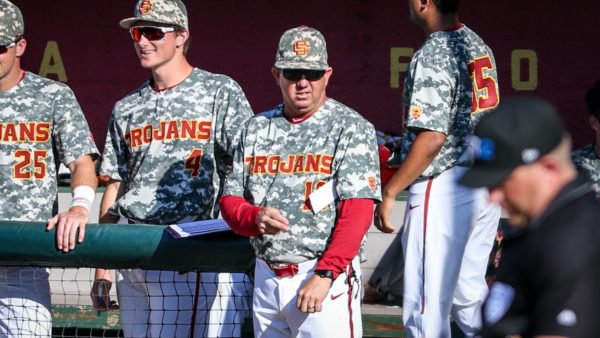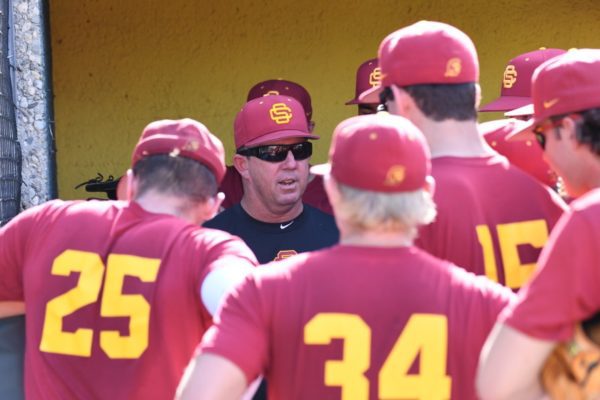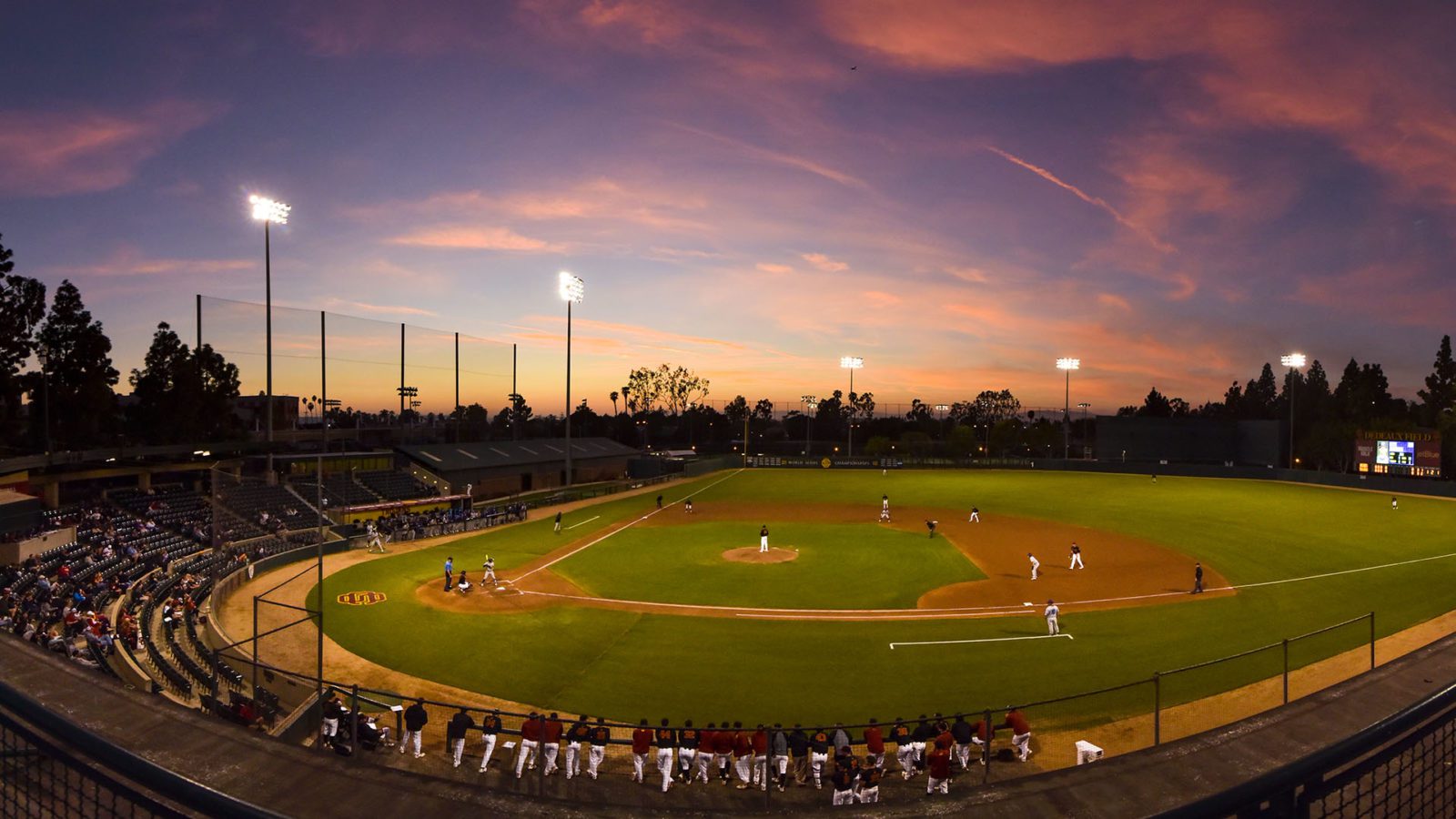Ryan Kartje (LA Times) — Tension had been building within USC’s baseball program long before Jamal O’Guinn swung and missed on a 3-2 pitch last May. For months before the Trojans’ final road trip of the season, to Utah, it bubbled beneath the surface, metastasizing during a campaign in which seven players had been suspended for violating pandemic protocols and the university had initiated two separate university investigations.
But it wasn’t until the final weekend that a season defined by inner turmoil exploded into the open and illustrated how far the Trojans were from being national title contenders. Illustrated, in fact, how far the program had fallen.
O’Guinn, a four-year starter and team leader, had a front-row seat as USC tumbled further and further from the ranks of the college baseball elite. His final season was particularly tumultuous, marked by an increasingly uneasy relationship between the Trojans and their head coach, Jason Gill.
O’Guinn had been coping with a torn elbow ligament that would require Tommy John surgery. His Trojans tenure was doomed to end without a trip to the NCAA tournament. Just once in the past 16 seasons (2015) had the program even reached the NCAAs.

USC’s Jamal O’Guinn waits for a pitch against UCLA on March 28, 2021. (Kyusung Gong / AP)
For O’Guinn, a seventh-inning solo home run in the opener of a three-game series against Utah felt as good of a way as any to finish. Teammates and staff congratulated him in the dugout, assuming, too, that his USC career was complete.
But O’Guinn had another turn at-bat in the ninth with USC ahead 7-3 and Gill didn’t pinch-hit for him. This time, O’Guinn struck out.
O’Guinn slammed his bat into the rack and cursed. He dropped his helmet at his feet, then stripped off his batting gloves, making his frustration clear to everyone, including Gill, who glared from across the dugout.
“Pick up your s—!” O’Guinn recalled Gill barking.
But O’Guinn refused. He believed Gill was putting on a show for a USC administrator in attendance. He deemed the behavior “eyewash” — baseball slang for “phony.”
Every grievance that piled up during USC’s frustrating season seemed to pour out from O’Guinn at once.
As their argument escalated after the final outs, Gill told O’Guinn he’d be flying home that night. One of USC’s clubhouse leaders was banned from the dugout and kicked off the team with two games remaining in his career.
At its height in the 1960s and ‘70s, USC was an unmatched baseball behemoth. Even two decades removed from its last College World Series appearance, the Trojans’ dozen national titles still dwarf every other collegiate baseball program. Only Texas and Louisiana State, with six apiece, are even halfway to matching USC and the legacy born of its legendary coach, Rod Dedeaux.
But by the time USC hired Gill — its fifth coach since Dedeaux’s retirement in 1986 — in the summer of 2019, the most storied program in college baseball history was a shell of its former self. USC had just finished with a losing record for the ninth time in 14 seasons. The school that had produced Randy Johnson, Mark McGwire and Tom Seaver, among dozens of other future MLB stars, hadn’t produced a first-round MLB draft pick since 2009 or been to the College World Series since 2001.
Gill, who won the West Coast Conference once in 11 seasons as coach at Loyola Marymount, appeared to some in the baseball community an unconventional choice to rebuild a powerhouse program. The Tustin native sold administrators on his winning pedigree and experience learning from Cal State Fullerton legends Augie Garrido and George Horton. Gill promised to implement a hard-nosed culture, one that focused on restoring pride and discipline to turn around the program.
Nearly two years later, any hope of a quick revival had dissolved by the time USC flew to Salt Lake City to close the 2021 season. The months leading up to the trip in May were marked by pandemic setbacks and dissension in the clubhouse. Some of the issues were outside the control of those pulling the program’s levers.
Others, however, were directly attributable to those same individuals, according to more than 20 people in and around the team. Their complaints are not uncommon for a struggling program faced with a difficult transition. But a steady stream of concerns from players, parents and members of the baseball community triggered multiple reviews and raised questions that linger into the current season.
“It became a snowball effect. Just, little by little, things piled up,” said Taylor Johnson, a redshirt freshman catcher on the 2021 team who quit baseball after the season and continued on as a student. “Guys kind of just shut down. It was just a mess.”
Ten players, along with three other people close to the program, told The Los Angeles Times that they believed Gill and pitching coach Ted Silva mistreated some players and staff, including longtime assistant coach Gabe Alvarez, in a concerted effort to drive them from the program. Some recall Gill barely speaking to them at all as USC’s season fell into disrepair down the stretch.
USC confirmed in a statement that it is “investigating allegations against Head Baseball Coach Jason Gill.”
“When a concern is raised about a coach or staff member, the university takes it seriously and looks into it,” USC said in its statement.
Gill declined to comment when reached by The Times and deferred to the university statement. At USC, officials say there is confidence Gill has the program moving in the right direction after a challenging 2021 campaign in which the Trojans finished 25-26.
As losses piled up, accusations flew around the clubhouse. Some players blamed teammates for giving up. One pitcher still with the program called it “the most toxic team I’ve ever been a part of.”
“When stuff doesn’t go the way you planned, whether you’re not winning games or you’re not getting the playing time you wanted, everybody wants to blame someone but themselves,” said John Thomas, an outfielder and team leader who graduated after last season. “There were guys on the team where that mindset was very apparent.”
Others pointed fingers directly at Gill.
“No one wanted to be there,” added an upperclassman who’s still on the team. “I was miserable. The culture of the team was terrible. There were a lot of kids that didn’t want to come back because of the coaches.”
The Times interviewed a dozen players from the 2021 team, as well as parents, scouts and others with direct knowledge of the inner workings of USC baseball, nearly all of whom spoke on the condition of anonymity for fear of retaliation from Gill, Silva or the university. Some have since transferred. Others remain at USC. A few, like Johnson, quit baseball altogether.

USC coach Jason Gill watches his team play. (Shotgun Spratling / For The Times)
As complaints from parents mounted and murmurs about the coach’s conduct grew louder, the university stepped in to investigate the program.
USC told The Times in response to questions in November that it was following protocol in allowing Gill to continue as coach while it completed its review. That investigation has now spanned more than seven months and included dozens of interviews with players, coaches, staffers and scouts.
“A staff member is presumed not responsible for reported misconduct until a determination is made at the conclusion of a formal university resolution process that the individual should be held responsible for it,” USC said in a statement.
The university’s investigation into Gill — at least its third into a coach during the past year — was launched less than two months after that final road trip in May, when the coach’s argument with O’Guinn spilled outside the stadium and into the parking lot.
O’Guinn unloaded on Gill with players, parents, assistants and a USC administrator all within earshot. He blamed the coach for the team’s downfall and told him he’d lost the respect of his players, 10 of whom told The Times they supported O’Guinn.
“I just went off,” O’Guinn said.
Their heated interaction was described during interviews with the investigator from USC’s Office of Conduct, Accountability and Professionalism. Many other questions were raised during those interviews about Gill’s treatment of staff and players during the 2021 season.
That investigation is ongoing, as USC baseball moves forward in 2022 with Gill at the helm. The Trojans have gotten off to a strong start, winning nine of their first 11 games this season during a stretch USC hopes will help put adversity of 2021 in the rearview mirror.
Current players told The Times Gill and Silva have changed their tone with players since they were informed of the university’s investigation. USC officials insist the shift is a sign of a better culture and a coach receptive to feedback.
When Gill first took the reins in the fall of 2019, his coaching style stood in stark contrast to his predecessor. Where Dan Hubbs was known for a more personable touch, Gill, players said, cast himself as a disciplinarian who demanded accountability.
But on the field, his way seemed to work initially. Players bought in. The Trojans won 10 of 15 games in 2020 under Gill before the pandemic suddenly halted the season.
“The vibe of the team was great,” recalled one veteran position player, who would later express his concern about the coach to The Times. “Gill was involved and committed. We beat the Nos. 1 and 2 teams in the nation before the shutdown, and I’m thinking, ‘Wow, this dude is the man.’”
But an incident the previous summer raised questions within the baseball community about Gill’s top assistant, Ted Silva.
While attending Urban Youth Academy in Compton in 2019, Silva was involved in a physical altercation with then-Arizona assistant coach Sergio Brown, his former teammate on Cal State Fullerton’s 1995 national title team.
Two witnesses, plus an event organizer who was not present at the time, said Silva, upset over Arizona’s attempt to recruit a former USC commit, approached Brown and started a physical altercation. The run-in was quickly quashed, but word of the incident spread through baseball circles, eventually reaching USC’s clubhouse.
In a statement, USC said it’s “aware of the allegation” involving Silva, which is currently under review.
When reached for comment, Silva, like Gill, referred The Times to a university spokesperson. Brown, now an assistant at San Diego State, declined to comment.
The major league draft was reduced to five rounds. Seniors were granted an additional year of eligibility and rosters were expanded. Typical management of 11.7 scholarships split into partial financial assistance for 27 players became more complicated, especially for USC, which offers four-year scholarships.
Several parents, players and others close to the program took issue with how Gill handled that pressing scholarship situation.
One parent of a former USC player said the family received a call from the coach last summer during which Gill told them he was pulling their son’s 85% scholarship, which was among the highest on the team. After some negotiation, the player ended up staying at USC on a significantly reduced scholarship and became a major contributor last season. But over the course of the call, the parent said Gill insulted their son, characterizing him as “lazy” and “undisciplined” and questioning his integrity.
Three other parents told The Times in an effort to help Gill navigate a difficult scholarship situation, they agreed to give back a percentage of their sons’ scholarship allotments ahead of the 2021 season with the promise they would be restored during subsequent seasons.
Instead, at the end of the season, Gill told those three players — and others — they had no future with the program. If they wanted to play, Gill said, they would be better off transferring.
One of those players did transfer, joining 10 others with eligibility still remaining who left USC baseball — or quit altogether — since the end of last season. Four more were told by Gill they didn’t belong at USC, but chose to stay anyway.
The mood within the program was positive as players returned to campus ahead of optional practices on Jan. 5, 2021, eager to put a grueling COVID-19 shutdown behind them and build on the progress of the previous season.
Two days later, seven USC players piled into a car and visited Morongo Casino Resort & Spa.
None of the players thought twice about the trip at the time. But early the next week, one by one, their regular COVID-19 tests came back positive.
None, at first, were forthright with USC coaches or administrators. Four of the seven had previously been cited for violating university COVID-19 policy, according to USC.
But word of the casino trip got around. The players called a Zoom meeting with Gill to confess. The coach’s hands were tied. He asked the team’s leadership group what it felt a fitting punishment might be. But university officials would soon become aware of the incident — and offer their own answers to that question.
On Jan. 18, Gill, associate athletic director Lindsay Jaffe and director of baseball operations Martin Butterick informed the seven that they were suspended. Those who previously violated COVID rules were suspended by the athletic department for half of the baseball season. The remaining three were told they would be sidelined for four weeks.
The group was initially cleared to return to campus for class, workouts and rehab following a 10-day quarantine. But the night before their scheduled return, they received an email from Lynette Merriman, a USC associate vice provost acting on behalf of USC’s COVID-19 Safety Committee.

Jason Gill talks to his players during a practice at USC. (Katie Chin / USC Athletics)
“Effectively immediately, you are barred from all University properties,” the email read. “… You are banned from attending all face-to-face University-sponsored activities.”
The email cited USC’s need to take “certain protective measures to reduce the threat of harm your actions pose to the health and safety of the university community.” The ban from campus, she wrote, would remain in effect until the end of the semester on May 13 — the final weeks of the baseball season.
The harsh ban stunned many within the program. In an appeal letter sent to Merriman, which was obtained by The Times, one suspended player wrote that the punishment was “severe and life-altering” and would damage his MLB draft status.
“We put a lot of people at risk,” another of the players told The Times, “and I believe we should’ve been punished. But the severity of it — I think I can speak for all of us — was scarring.”
In a statement, the university noted that 277 students were similarly restricted from accessing campus for a semester during the 2020-21 academic year following a failure to comply with COVID-19 restrictions that “were implemented to prevent widespread infections among our university community.”
Subsequent player appeals were denied by USC, which maintained they still posed a threat to the university community.
Dismayed with the process, the players’ families hired attorneys to challenge the university’s decision instead.
A judge granted a stay of the university’s order days later, and USC ultimately backed down from the suspensions. The original punishments, handed out by athletics, remained intact.
When the seven players finally returned, the tension in the clubhouse was palpable. Four of them had missed 26 games as a result of their violation. Resentment swelled among the seven and some of their teammates.
“It was something we never fully recovered from,” one player said.
The team was exhausted as it headed home from a long weekend in Seattle in late March. After three games in frigid rain, 40-degree weather and delays, USC came away with a road sweep on its first Pac-12 trip, its only such stretch of the season. But the cold weather left players tight and sore upon returning to L.A. late that Sunday night.
A voluntary weight-lifting session was scheduled for early the next morning. So O’Guinn and another teammate asked Gill if the team could take the morning off.
The coach’s response, which was confirmed by four more players, was later relayed in interviews as part of USC’s compliance inquiry.
In response to questions from The Times, the university noted only that “all matters alleging NCAA violations have been investigated.”
A person familiar with the findings who was not authorized to speak publicly told The Times that compliance found a single Class III secondary NCAA violation had been committed. That violation, according to another person privy to those findings, accounted for just one hour of practice time, for which the NCAA accepted a self-imposed penalty of two fewer hours of practice for USC.
Under NCAA rules regarding voluntary activities, “neither the institution nor any athletics department staff may require the student-athlete to participate in the activity at any time.” But the line between what’s explicitly required by coaches — and what’s strongly suggested — is regularly blurred, making determining a coach’s intent especially difficult.
Players and others close to the program say Gill regularly waded into the gray area. Ten of the 12 players who spoke to The Times were resolute in their belief that USC’s voluntary lifts were not truly voluntary and that players would face reprisals if they didn’t attend.
Outfielder John Thomas, however, disagreed Gill pressured them to attend Monday workouts. He said the pressure to participate came from team leaders, himself included.
As the 2021 season dragged on, players began to complain about their exhaustion, the debate about workouts becoming yet another toxin in a lost season. While losses piled up, players say Gill grew less and less engaged.
“His demeanor changed,” O’Guinn said. “Over the course of practice days, he wasn’t present. Then the game would come and he’d be there all of a sudden.”
“It felt like I was walking on eggshells,” Johnson said.
Two players said they were dealing with mental health issues, including depression, during the difficult campaign and received no support from Gill or Silva.
“You could feel that [players] were beaten down,” one person close to the program said. “They just needed someone to communicate that they understood what they were going through.”
A few days before the final series of the season, with USC already eliminated from postseason contention, Gill called a handful of players into his office individually. Among them were upperclassmen, preparing to travel for their final weekend, and young players who sacrificed scholarship money before the season.
All were told their time at USC was ending early.
“He told me he wanted me to leave and that I wouldn’t play at USC anymore,” Johnson said. “He was just talking s— the whole time about me and how I wasn’t good enough.”
For the upperclassmen, it was an abrupt, unceremonious conclusion to their USC careers.
“It’s nothing personal,” one of those players, a four-year veteran, recalled Gill telling him.
But the decision landed with a thud inside the clubhouse. After the season’s last game was played, many players told The Times that their departing teammates professed relief in the locker room that they would never wear a USC uniform again.
The majority of the players who traveled to Utah for the 2021 season finale series did their exit interviews in the Salt Lake City airport. Gill and Silva, sitting at a different gate than the team, texted players one by one to summon them to the coaches’ gate. The location was highly unusual for such personal conversations, with other passengers close by as coaches discussed the players’ futures. When a player was done — often after just a few minutes — he left the gate to sit with teammates.
When it came time to fly back to Los Angeles, the team boarded a flight with Alvarez and Silva, while Gill took a different flight into Orange County. To players, it felt like a fitting way to end a season defined by their disconnect with the coach.
In the weeks that followed, complaints poured in, both from parents outside the program and other people within. Alvarez, a Trojan alum and assistant of 11 years, left the team; his exit, according to players and two others familiar with his thinking, stemmed from disagreements with the direction of the program.
By July, a senior USC investigator had begun contacting players and USC staffers about “confidential concerns regarding allegations against a USC staff member.”
That investigation continues to drag on nearly eight months later.
Aware of the investigation into his behavior, Gill has tried to put the previous season behind them, players say. But as he spoke to the team during their first meeting ahead of this season, two players told The Times he took a brief moment to reflect on the turmoil of 2021.
“I’m going to be honest,” he told them. “Last year’s team was the worst team I’ve ever been a part of.”
latimes.com
_________
TrojanDailyBlog members — Always feel free to add information or new topics to the TDB which don’t necessarily pertain to any particular moderator post or member comment.

SC did win 2 out of 3, despite their ace pitcher missing the series.
The Bruins are smoking the Trojans. It is late. Good night all.